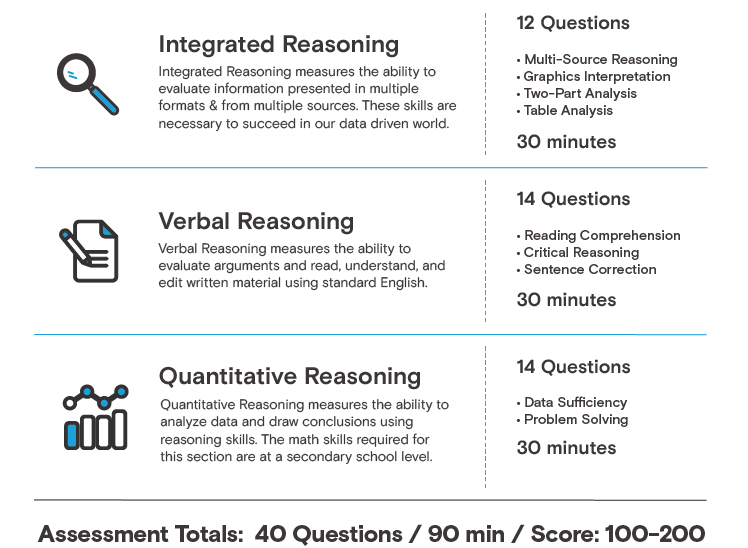Envision taking a powerful leap towards success in the world of business, but you’re not sure where to start. The answer can often be found in three simple letters – MBA. The MBA Executive Assessment test is the golden ticket to this illustrious journey. This test, designed by the Global Management Admission Council (GMAC), could be the key that unlocks an impressive cadre of global executive MBA programs. But what exactly does it involve, and what’s the best way to prepare?
The MBA Executive Assessment test is your stepping-stone to a higher echelon of skills, networking, and opportunities. It’s a reflection of your readiness for the rigors of an Executive MBA program and, by extension, your potential for corporate leadership.
Whether you’re a business hotshot looking to get ahead, or perhaps a novice with a bullish ambition to conquer the corporate world, this article will guide you step-by-step through the intricacies of the MBA Executive Assessment Test.
Understanding the Structure of the MBA Executive Assessment Test
| Section | Type | Number of Questions | Time Allotted |
|---|---|---|---|
| Integrated Reasoning | Multiple choice | 12 | 30 minutes |
| Verbal Reasoning | Multiple choice | 14 | 30 minutes |
| Quantitative Reasoning | Multiple choice | 14 | 30 minutes |
| Total Test Time | 90 minutes | ||
To ensure optimal performance on each section of the MBA Executive Assessment Test, a thorough understanding of what each section entails is crucial. The Integrated Reasoning section, comprised of 12 questions, tests your ability to evaluate data presented in diverse formats, such as tables and graphics. Your skill in analyzing complex scenarios and providing meaningful interpretations will be put to the test here.
Moving forward, the Verbal Reasoning section includes 14 questions that evaluate your skills in complimentary areas such as reading comprehension, critical reasoning, and sentence correction. This section gives you a chance to showcase your command over standard English language, as well as your ability to dissect arguments and correct grammatical anomalies.
Lastly, the Quantitative Reasoning section, which comprises of another set of 14 questions, necessitates an aptitude for data analysis, drawing conclusions from that data, and applying secondary school level math skills. The questions in this section primarily focus on data sufficiency and problem-solving.
Despite the test seeming daunting, it is designed to measure your core business skills — notably, higher-order reasoning. It’s not just about what you know, but how you apply it. Hence, you might feel that extensive preparation is not necessary. However, familiarizing yourself with question formats and honing your problem-solving skills can certainly give you an edge. Crafting the right strategy for the MBA Executive Assessment Test will always depend on your individual strengths and weaknesses, and, as with most things, practice makes perfect.
Choosing the Right Study Materials for Your MBA Executive Assessment Test
When selecting study materials for your Executive Assessment (EA) test, it’s essential to choose resources that cover all the necessary areas. These include Integrated Reasoning, Verbal Reasoning, and Quantitative Reasoning. You should also focus on materials that provide ample practice with assorted formats, paralleling the exam’s diverse structure.
If you’re an experienced business professional targeting Executive MBA programs, the EA test, designed by the Graduate Management Admission Council (GMAC), is your go-to. The materials you choose should help you brush up on your problem-solving abilities, logical reasoning, and data analysis skills, as these are crucial for acing the exam.
While the GMAC suggests that heavy preparation is not necessary due to the assessment’s formatting, this suggestion is not an “all access” pass to neglect mindful study. In fact, focusing on key areas like basic math skills, English grammar, and reading skills can give you an edge. Therefore, choosing the right study materials is a critical part of your test preparation.
Remember that the goal is not just to pass but to achieve a competitive score. This score is your ticket to globally accepted universities like Wharton, Yale, INSEAD, and many others that utilize the EA test for entrance into their degree programs.
There are various study resources available from GMAC, including the Executive Assessment Official Guide, as well as prep courses from various companies. The key lies in choosing the best resources that accurately fit your individual study requirements and learning style.
Finally, practice persistently. Like with any test, the more you practice, the more comfortable you become with the exam’s structure and the better your performance. Remember, preparation is crucial, and investing in the right learning materials is a step towards acing your Executive Assessment test.
Executive Assessment
Imagine an entrance examination tailored specifically to determine how suited you are to enroll in an Executive MBA – a specialized business program designed for seasoned professionals with a decade of experience under their belt. This is essentially what the Executive Assessment is. Orchestrated by the Graduate Management Admission Council (GMAC), the test is carefully structured for leaders of industry seeking to elevate their careers with advanced studies, without the plentiful spare time necessary to prepare for the traditional GMAT.
The Executive Assessment shines a spotlight on your existing professional prowess, comprehensively analyzing attributes such as your reasoning capabilities, critical-thinking skills, communicative competency, and problem-solving ability.
The Layout, Scoring, and Price of the Executive Assessment
Navigating the EA entails a computer-based endeavor that offers you the flexibility of either visiting a certified test center or taking it from the comfort of your own home online. Your scores may vary between 100 and 200. Bear in mind that your scores will be benchmarked not only against the candidates applying for the same program but also against those who have already been granted admission. A score above 150 is typically viewed as a robust EA score. The EA is priced at $350 and the validity of your scores extends over a five-year span.
What does the Executive Assessment comprise of?
Comparable to the GMAT in its section structure, the Executive Assessment includes three sections: Integrated Reasoning, Verbal Reasoning, and Quantitative Reasoning. However, unlike the GMAT, it skips the necessity of an essay section and requires significantly less time, just 90 minutes, as opposed to the GMAT’s 3.5 hours. During this period, you would encounter a total of 40 questions. Let’s delve a bit deeper into each of these sections.
Integrated Reasoning: The Integrated Reasoning section is a 30-minute analytical drill comprising 12 questions. It probes your skills in deciphering graphics and tables, scrutinizing intricate problems, and answering multiple-choice queries. The essence here is how well you can logically reason with multi-format, multi-source information.
Verbal Reasoning: The Verbal Reasoning section is a linguistic challenge of 14 questions to be solved in 30 minutes. Your proficiency in reading comprehension, argument evaluation, and sentence correction will be put to the test. Essentially, it checks your ability to process, interpret, and tweak written content effectively.
Quantitative Reasoning: Finally, you have the Quantitative Reasoning section which gives you 30 minutes to show off your numeric prowess in 14 questions. This section explores how effectively you can interpret data and resolve problems. Analytical data deciphering and basic math skills, including arithmetic and some algebra, are essentially in play here.
Conclusion
While there might be some similarities between the Executive Assessment and the GMAT, it’s worth noting a key difference. Unlike the GMAT which doesn’t have an essay section, the EA’s question difficulty adjusts not on each question but after you finish a section or a group of questions.
When put side by side with the GMAT and GRE, the Executive Assessment might appear to be an easier option due to its shorter duration. However, don’t be fooled. Its complexity level is similar, and it has been specifically designed for those eyeing executive MBA programs.





Social Media